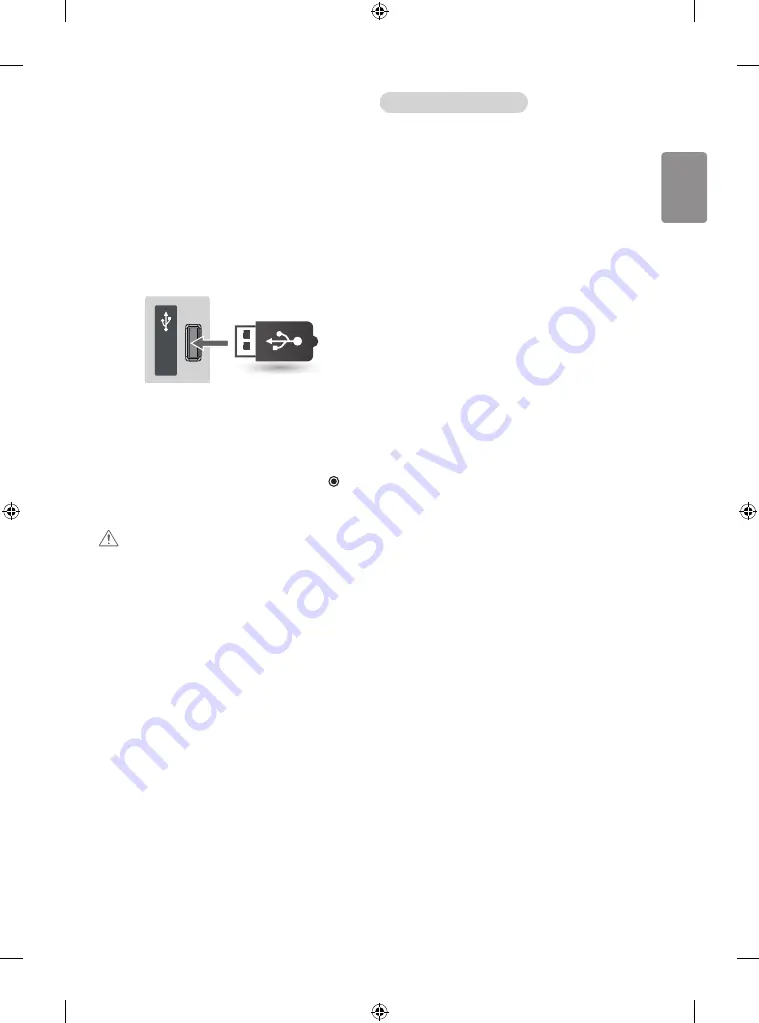
ENGLISH
19
ENTERTAINMENT
(Depending on model)
* Image shown may differ from your TV.
Connecting USB storage devices
Connect USB storage devices (USB memory) to the TV and use
multimedia features (See “Browsing files” on page 20).
Connect a USB flash memory or USB memory card reader to the TV as
shown on the following illustration.
USB IN
To disconnect a USB storage device,
make sure to end the connection properly to prevent damages to the
TV or files.
1 Press
Q.MENU
to access the quick menus.
2 Press the Navigation buttons to scroll to
Eject
and press
OK
.
3 Disconnect the USB storage device only when the message says that
it is safe to remove.
CAUTION
•
Do not turn the TV off or remove a USB storage device while the
USB storage device is connected to the TV, as this could result in
loss of files or damage to the USB storage device.
•
Back up your files saved on a USB storage device frequently, as you
may lose or damage the files and this may be not covered by the
manufacturer’s warranty.
Tips for using USB storage devices
•
Only a USB storage device is recognizable.
•
If the USB storage device is connected through a USB hub, the
device is not recognizable.
•
A USB storage device using an automatic recognition programme
may not be recognized.
•
A USB storage device which uses its own driver may not be
recognized.
•
The recognition speed of a USB storage device may depend on
each device.
•
Please do not turn off the TV or unplug the USB device when
the connected USB storage device is working. When such device
is suddenly separated or unplugged, the stored files or the USB
storage device may be damaged.
•
Please do not connect the USB storage device which was artificially
manoeuvred on the PC. The device may cause the product to
malfunction or fail to be played. Never forget to use only a USB
storage device which has normal music files, image files or movie
files.
•
Please use only a USB storage device which was formatted as a
FAT16, FAT32, NTFS file system.
•
Please connect a USB storage device with the cable offered by the
device maker.
•
Some USB storage devices may not be supported or operated
smoothly.
•
Be sure to back up important files since data stored in a USB
memory device may be damaged. We will not be responsible for
any data loss.
•
If a USB memory device is connected to a USB multi-card reader, its
volume data may not be detected.
•
If the USB memory device does not work properly, disconnect and
reconnect it.
•
How fast a USB memory device is detected differs from device to
device.
•
The recommended capacity is 1 TB or less for a USB external hard
disk and 32 GB or less for USB memory.
•
Any device with more than the recommended capacity may not
work properly.
•
USB storage devices below USB 2.0 are supported as well. But they
may not work properly in the movie list.
•
Maximum of 999 folders or files can be recognized under one
folder.
•
If there are a lot of folders or files all within one folder, the device
may not be able to access these properly.
•
For external USB HDDs, it is recommended that you use devices
with a rated voltage of less than 5 V and a rated current of less
than 0.5A.
















































